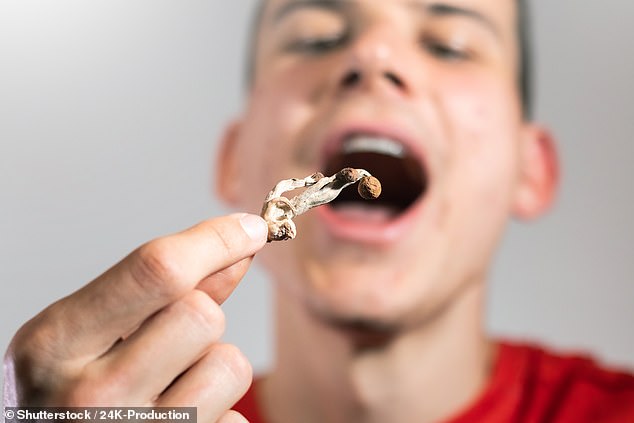Psychedelic drugs can improve your sex life: magic mushrooms and LSD boost sexual arousal, satisfaction and attraction to your partner, research shows
They are known to induce psychedelic experiences.
And now a new study has revealed another side effect of magic mushrooms and LSD.
Researchers from Imperial College London say these drugs can boost sexual arousal and performance.
“We believe this is the first scientific study to investigate the effects of psychedelics on sexual function,” said Tommaso Barba, first author of the study.
‘Our findings suggest potential implications for conditions that negatively impact sexual health, including clinical depression and anxiety.’
Researchers from Imperial College London say psychedelic drugs can boost sexual arousal and performance (stock image)
The first known scientific research into the effects of psychedelics has shown that people report improvements in sexual functioning for several weeks after a ‘trip’.
Researchers from Imperial College London asked almost 300 people to complete questionnaires before and after a psychedelic experience.
They focused on two groups: people who used psychedelics for recreational or wellness purposes, and a small group from a clinical trial assessing psylocibin, the compound found in magic mushrooms.
Analysis found that on average, people reported improvements in a range of areas of sexual functioning for up to six months after their psychedelic experience.
This included their enjoyment of sex, sexual arousal, satisfaction with sex, attraction to partner, their own physical appearance, communication and their sense of connection.

Among the small group who used psilocybin in the Clinical Trial for Depression, they found that almost half of participants reported improvements in sexual arousal, interest, and satisfaction with sex (stock image)
Among the small group who used psilocybin in the clinical trial for depression, they found that almost half of the participants reported improvements in sexual arousal, interest, and satisfaction with sex.
However, people treated with a leading antidepressant usually reported a decline in sexual function.
According to the team, the findings, published in Nature Scientific Reports, open the possibility for applications in a range of therapeutic settings, such as couples therapy.
They also highlight even more potential benefits in treating depression, with psychedelic compounds such as psilocybin potentially helping to prevent drug-induced sexual dysfunction – one of the biggest side effects of current gold standard antidepressants.
Mr Barba said: ‘At first glance this kind of research may seem ‘quirky’, but the psychological aspects of sexual functioning – including how we think about our own bodies, our attraction to our partners and our ability to connect intimately with people – are all important to the psychological well-being of sexually active adults.
‘Sexuality is a fundamental human motivation. For example, we know that sexual dysfunction is linked to lower well-being in healthy adults, can influence relationship satisfaction and is even linked to subjective happiness and ‘meaning in life’.”
The authors said that overall, neither study found a significant change in participants’ perceived importance of sex after a psychedelic experience.
This indicates that psychedelics do not cause an excessive focus on sex or ‘hyper-arousal’; instead, they may transform the way individuals perceive and interact with sexual experiences, which could lead to improvements in sexual well-being.
They cautioned that while their findings are encouraging, people with depression should not attempt to self-medicate with psychedelics.
Dr. David Erritzoe, Clinical Director of the Center for Psychedelic Research, said: ‘This study sheds further light on the far-reaching effects of psychedelics on a range of psychological functioning.
‘While the findings are indeed interesting, we are still far from a clear clinical application, as psychedelics have yet to be integrated into the medical system. We may see a clinical application in the future, but more research is needed.”
Both LSD and magic mushrooms are illegal Class A drugs that carry a maximum penalty of seven years in prison for possession.
